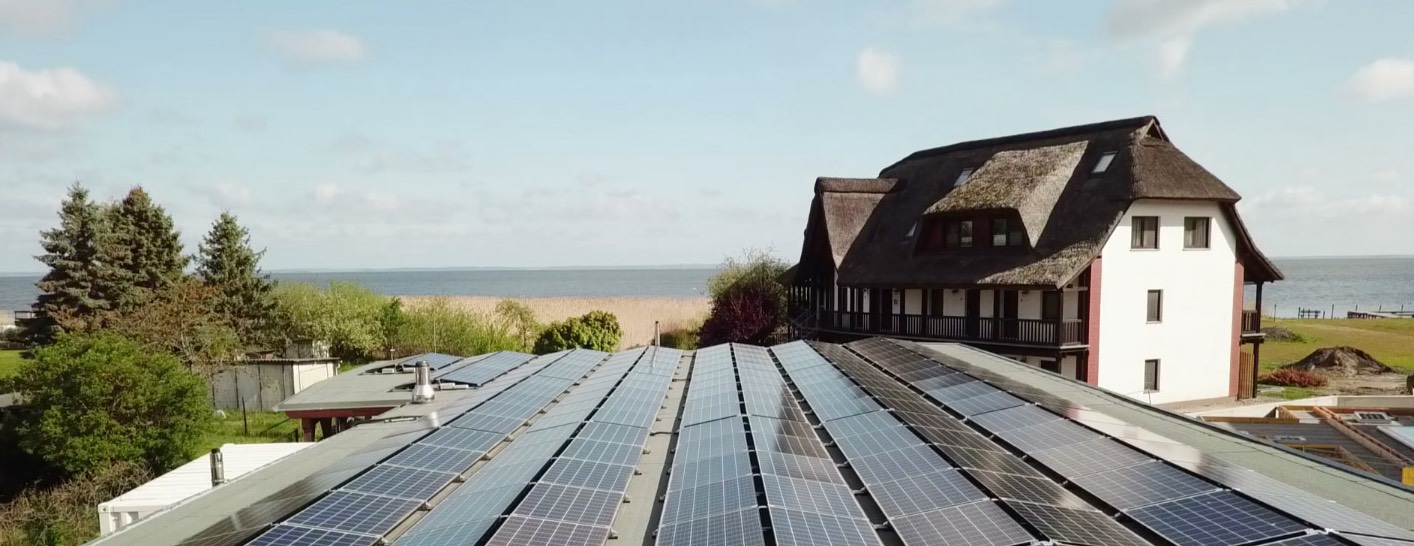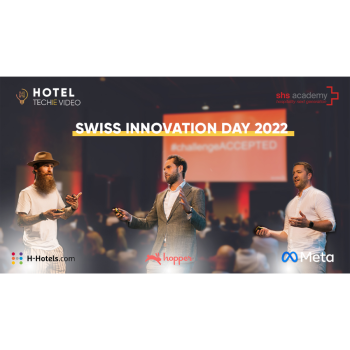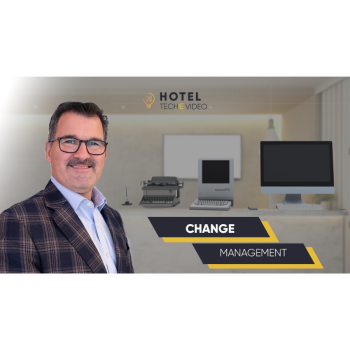
Generating one´s own eco energy and running a completely sustainable business - Dirk Klein transformed his vision into reality with Hotel Haffhus. Read more to learn how he did it, and how you can too.
Sustainability and green energy have been important topics in the hotel industry for some time. But the current energy crisis and the resulting skyrocketing price increases for gas and electricity lend a new sense of urgency to the issue.
Hotel Haffhus in northern Germany has been successfully tackling this topic in depth for a long time. So we invited Dirk Klein, Head of Sustainability & Digitalization at Hotel Haffhus, to chat with us on our [German language live stream]
He shared his experiences of energy independence with Marco Baurdoux from Hotel-Spider and offered important insights into how he planned and implemented various sustainability practices in Hotel Haffhus.
This article summarizes the main points and will hopefully provide you with some inspiration for your own initiatives.
Sustainability and guest expectations
It isn't just climate change and energy prices that are pushing sustainability into the forefront for many hotels. Guest demands also play a role here. In a study by Booking.com, 78% of respondents said that they want to book at least one sustainable hotel in the next year.
According to this data, demand is also increasing for environmentally friendly properties. For hotels, this often means a balancing act, as they don't want to compromise on service or quality.
“Guests have certain expectations and want a certain level of comfort, even in a green hotel. Our role is to provide this using sustainable energy, resources, and products. Travelers should be able to rely on us in this arena and be able to enjoy luxury with a clear conscience,” Dirk says.

Hotel Haffhus’s path to energy independence
Dirk and his team at Hotel Haffhus have worked hard on this sustainable focus over several years. An in-depth analysis was run at the very beginning: “Initially, we needed to know how much energy we were actually using, and which services were most energy intensive. The spa offer in particular requires a lot of electricity, for example, and can make up to 50% of total use for small properties,” Dirk explains.
Then began the search for partners to advise them and implement their ideas: “We wanted someone who offered a holistic concept and keeps all elements in view. They needed to understand that we work with different room occupancies, and so our energy needs vary. This had to be taken into account when developing our solution to ensure adequate supply at all times.".
At the same time, Dirk undertook extensive research on the various ways to generate energy himself and use it as efficient as possible. He learned some valuable lessons from this phase: “It quickly became clear to me that we could only find the best option if we really understood our own needs. Once we were able to provide our partners with a list of our ideas, we got a solution that was completely tailored to us.”
And finally, financing was also an important point. Since retrofitting an entire hotel involves a considerable financial effort, long-term planning was required here: “Overall, we invested around 1 million Euro in the whole project. The amortisation period is between 12 and 15 years. And because the next generation wants to continue the family business, it’s a good investment.”
After Haffhus finally overcame this hurdle, the hotel was able to get off the grid in 2018 and now supplies all of its own needs using completely green energy.
“Currently, one kilowatt-hour of power costs us around 12 cents. You can see how different that is to the current grid price of 48 cents per kWH.”
Energy independence in practice
Few guests even notice that Haffhus creates its own energy. Only the photovoltaic installations and engineering shed hint that this hotel runs slightly differently to what you're used to.
In the summer, the solar energy system (Photovoltaic system) brings in the majority of the energy, with 150 kilowatts of power. In winter, and on cloudy days, wood chip heating and co-generation unit generate heat and energy. Battery and heat storage ensure that there are always sufficient reserves on hand, so supply is guaranteed even during periods of high use.
“Since we are completely self-sufficient, we have higher energy consumption, because everything runs on electricity. For example, this includes the electric kitchen, the heat pump, electric cars, and the spa. In summer, we can meet our needs pretty well using the photovoltaic system. But in winter, in particular, we also need other systems for support,” Dirk explains.
All in all, we therefore always keep an eye on how much we produce, consume and store so that we can adjust our processes if necessary.
This way, we keep the generation and consumption fairly similar to avoid unnecessary storage and retrieval and the related loss of energy," Dirk continues.
Dirk and his team can see exactly where the energy is flowing using the overview of their energy management system. They can use this at any time to check which equipment is producing energy, where it’s being used, and how much is being stored. Guests can access the dashboard via the website. This allows them to see in real-time how the hotel is using its independent energy supply.

Sustainability as guest magnet?
When asked whether implementing this level of sustainability has attracted more guests, Dirk has an interesting answer: "We offer a destination for guests who value that kind of thing. And although surveys always reveal that travelers want to stay at environmentally friendly hotels, the majority still just book using OTAs, without really thinking much about sustainability.”
But as soon as guests are on site, it’s easy for Dirk and his team to get them excited about the various sustainability practices at Hotel Haffhus: “We communicate really openly about our concept and share all of our info and data about our energy houshold on our website. Guests find it exciting to see where we get our energy from and where we use it. This creates a new level of awareness about the topic and "brings it closer to them in a vivid way."
Hotel tours are also well received. Dirk shows guests individual systems and explains how they function and work together. This has already inspired some guests to take a closer look at the topic themselves. It also highlights that Haffhus really take the topic seriously, and don’t just see it as a marketing ploy. This always leads to good reviews, word-of-mouth recommendations, and motivates guests to come back.
At first, the idea of getting off the grid and powering a hotel independently may not seem like an obvious solution. But the example of Hotel Haffhus shows that it really is possible, and that it can offer a lot of benefits. In addition to saved CO2 and lower energy costs, an enriched guest experience is also an important consideration.
So now we have a question for you: Where will you start to make your hotel greener?



